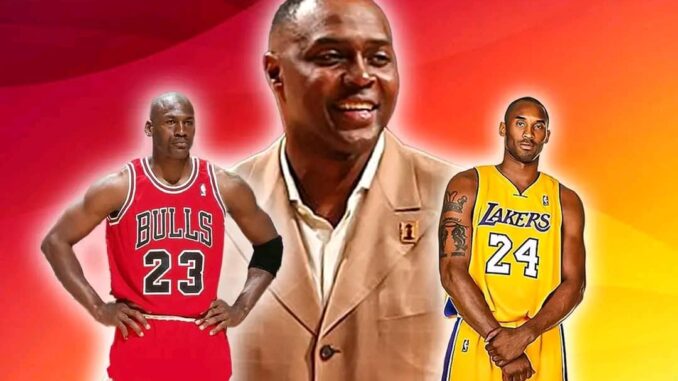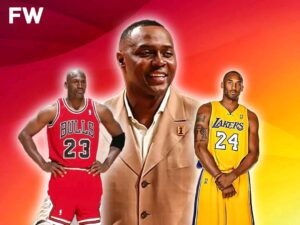
Horace Grant Declares Kobe Bryant’s Competitive Edge Surpasses Michael Jordan’s: A Deep Dive into Two NBA Legends
In a bold and unexpected declaration, former NBA champion Horace Grant has sparked a heated debate within the basketball community by claiming that, in terms of pure competitiveness, Kobe Bryant ranks above the widely recognized GOAT (Greatest of All Time), Michael Jordan. As a player who had the rare privilege of sharing the court with both superstars—first with Jordan during the Chicago Bulls’ historic championship runs in the 1990s, and later with Bryant during his time with the Los Angeles Lakers—Grant’s perspective provides an insightful and unique take on two of the NBA’s most revered figures.

Grant’s assertion has reignited the age-old debate of who reigns supreme between Jordan and Bryant, two players whose tenacity, work ethic, and drive for success transformed the game of basketball and set new standards for what it means to be an NBA superstar. Grant, however, separates their approaches to competition in a way that has raised eyebrows across the basketball world.
In an interview, Grant stated:
“In terms of pure competitiveness, it’s Kobe #1 and Michael Jordan #2. I played with both guys, and I can tell you that for certain. You know when the captains go to center court with the referees before a game, and everybody shakes hands for the cameras? MJ would look you right in the eye when he was shaking your hand. Sometimes he would even smile. But while you were smiling, MJ would be thinking about how he’s going to put his foot on your neck. He was diabolical like that.”
He continued, describing Bryant’s approach as even more direct:
“Kobe was different. He would come right up to you during the handshake and tell you he didn’t like you and that he was going to destroy you. Seriously, he wouldn’t just say it in the pregame, he would say it in the heat of battle. He didn’t care who you were. He’d say, ‘I can’t believe they’re putting you on me. Are you serious? You think you can guard me?’ And he wasn’t joking. He meant it. And the defender knew he meant it. That’s the difference. He would plant that seed of doubt in their mind. And when you had that seed of doubt against Kobe, it was over.”
Grant’s comments, while shocking to some, offer a rare glimpse into the psyches of two basketball icons who, despite their different approaches, shared a common goal: to win at all costs. Let’s take a deeper look into why Grant believes Kobe Bryant was more competitive than Michael Jordan, and what this means for their respective legacies.
The Competitive Edge: Jordan vs. Bryant
Michael Jordan, widely considered the greatest basketball player of all time, is legendary for his competitiveness. From his days at the University of North Carolina to his dominance with the Chicago Bulls, Jordan’s will to win was unmatched. His career accolades speak for themselves: six NBA championships, five MVP awards, 10 scoring titles, and an unwavering legacy of clutch performances that cemented his place in basketball history.
Jordan’s competitiveness wasn’t confined to just basketball. Stories of his obsession with winning in golf, gambling, or even friendly games of cards are well-documented. Teammates and opponents alike have recounted tales of Jordan’s insatiable desire to dominate in everything he did. His practice habits were infamous—he would push himself and those around him to their physical and mental limits, often resorting to psychological tactics to get the best out of his teammates.
Jordan’s “killer instinct,” a phrase often used to describe his approach to the game, was rooted in his ability to identify and exploit opponents’ weaknesses. He would smile during pregame handshakes, disarm his rivals with a false sense of camaraderie, and then proceed to dismantle them on the court. As Grant described, Jordan was “diabolical” in his ability to lull opponents into a false sense of security, only to dominate them when the game began.
Kobe Bryant, on the other hand, approached competition with an even more aggressive, confrontational style. Bryant’s “Mamba Mentality” has become the stuff of legend, a phrase that encapsulates his singular focus, dedication to excellence, and relentless pursuit of greatness. From the moment he entered the league as an 18-year-old phenom in 1996, Bryant was determined to be the best, and he wasn’t afraid to let his opponents—and teammates—know it.
Unlike Jordan, who was more subtle in his psychological warfare, Bryant was brutally honest, often confronting his opponents head-on. He didn’t need to mask his intentions behind a smile. As Grant noted, Bryant would openly tell his defenders they had no chance against him, planting seeds of doubt that would ultimately lead to their downfall.
This direct approach, combined with Bryant’s tireless work ethic and obsession with perfecting his craft, made him one of the most feared competitors in NBA history. He didn’t just want to win—he wanted to destroy anyone who stood in his way. Whether it was in practice or during games, Bryant’s intensity was palpable. He would berate teammates who didn’t meet his standards, push himself to play through injuries, and study opponents obsessively to gain any advantage.

While Jordan’s competitiveness was often described as cunning and calculated, Bryant’s was raw and unfiltered. Both approaches were effective, but Grant’s comments suggest that Bryant’s sheer ferocity set him apart, even from Jordan.
Psychological Warfare on the Court
One of the key differences Grant highlighted between Jordan and Bryant was their approach to psychological warfare. Jordan’s method of getting into his opponents’ heads was often subtle and layered. He would study his opponents, find their weaknesses, and exploit them without ever letting them know what he was doing. His calm demeanor during pregame handshakes belied the storm that was coming once the game started.
Jordan had a reputation for being able to demoralize his opponents with a single look or comment. His ability to talk trash was legendary, and he used it to great effect, often breaking down opponents mentally before he destroyed them physically. His famous “flu game” in the 1997 NBA Finals, where he played through illness to lead the Bulls to victory, is an example of how Jordan could elevate his game in critical moments, further intimidating those who dared to challenge him.
Bryant’s psychological tactics were more straightforward. He didn’t hide his intentions behind a smile or a handshake. Instead, he would let his opponents know, in no uncertain terms, that they were going to lose. Bryant’s trash talk was often more personal and direct, challenging his defenders’ abilities to guard him and planting seeds of doubt that would fester throughout the game.
Bryant’s famous duels with players like Allen Iverson, Tracy McGrady, and Vince Carter were battles of skill and will, but they were also psychological wars. Bryant’s ability to challenge his opponents mentally, combined with his supreme confidence in his own abilities, often left defenders feeling defeated before the game even began. As Grant mentioned, once Bryant planted that seed of doubt, it was over.

This level of intensity made Bryant a terrifying competitor, even more so than Jordan in Grant’s eyes. While Jordan was undoubtedly a master of psychological manipulation, Bryant’s willingness to directly confront and demoralize his opponents gave him an edge that few could match.
Work Ethic and Obsession with Perfection
Another factor that set Bryant apart from Jordan, according to Grant, was his work ethic and obsession with perfecting his game. Both players were known for their relentless drive to improve, but Bryant’s approach bordered on the obsessive.
Bryant’s infamous 4 a.m. workouts became part of his legend. He would practice for hours before team practice, focusing on every aspect of his game, from footwork to shooting mechanics. His attention to detail was unparalleled, and he often studied his opponents obsessively, watching hours of game tape to find any possible advantage.
Jordan’s work ethic was also legendary, but Bryant’s approach was different in that he sought to emulate—and surpass—his idol. Bryant famously modeled his game after Jordan’s, studying every move, every gesture, and every nuance of Jordan’s play. He was determined not just to be like Mike, but to be better than him.
This obsession with perfection often led to tension with Bryant’s teammates, who struggled to meet his demanding standards. Bryant was known for being hard on his teammates, pushing them to their limits in practice and berating them when they didn’t perform to his expectations. While this made him a polarizing figure in the locker room at times, it also elevated the Lakers to new heights.
Jordan, by contrast, was often described as a more natural leader, able to inspire his teammates while still maintaining his dominance on the court. His leadership style, while intense, was less confrontational than Bryant’s. Jordan had a unique ability to push his teammates without alienating them, a skill that helped the Bulls win six championships during his tenure.
However, Bryant’s willingness to go to extremes in pursuit of perfection is what set him apart in Grant’s eyes. While both players were fiercely competitive, Bryant’s obsession with being the best, and his willingness to do whatever it took to achieve that goal, gave him an edge that even Jordan couldn’t match.

Legacy and Impact
In comparing Jordan and Bryant, it’s important to consider their respective legacies and impact on the game of basketball. Jordan’s legacy is cemented as the greatest player of all time. His six championships, countless accolades, and global influence have made him a cultural icon whose impact transcends the sport.
Jordan’s influence on the game is immeasurable. He revolutionized the way basketball was played, popularized the NBA on a global scale, and inspired an entire generation of players, including Kobe Bryant. His brand, Air Jordan, continues to dominate the sneaker industry, and his presence in popular culture remains strong
Leave a Reply